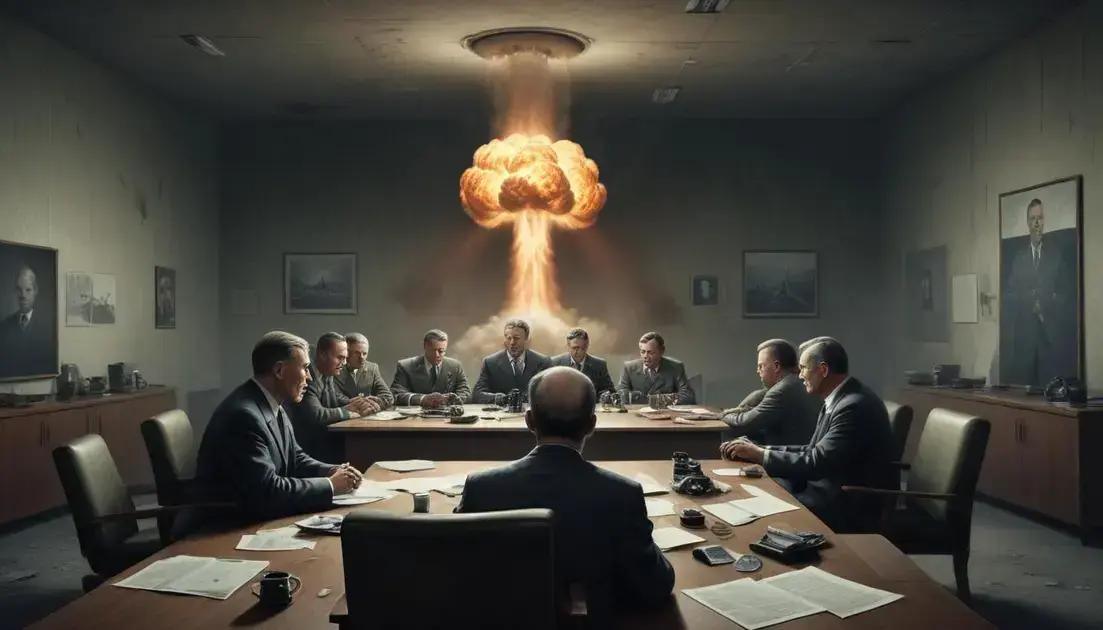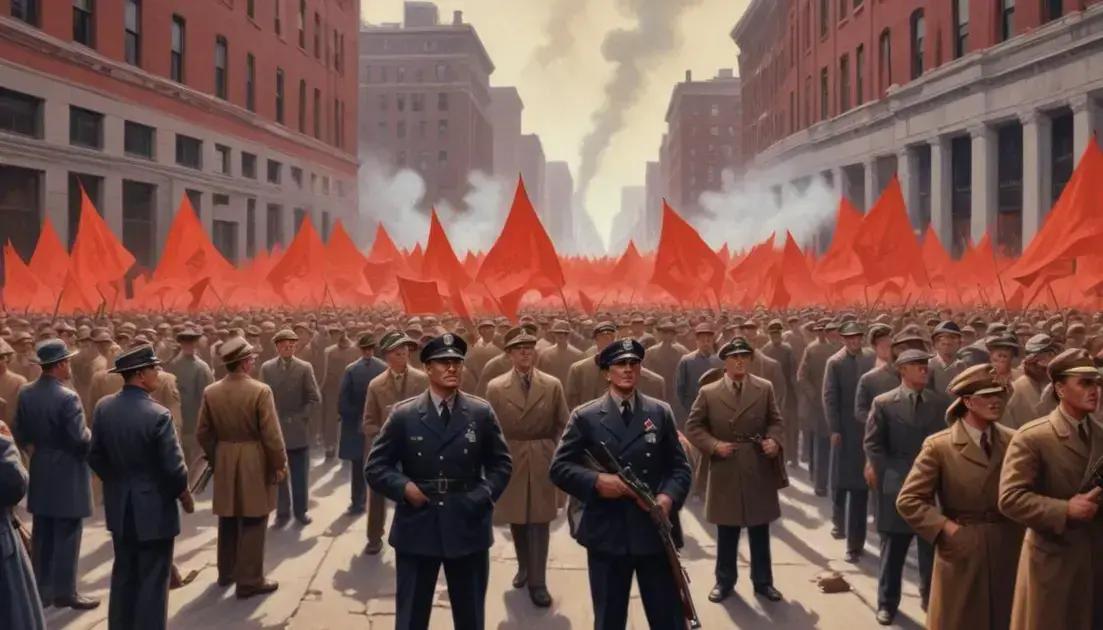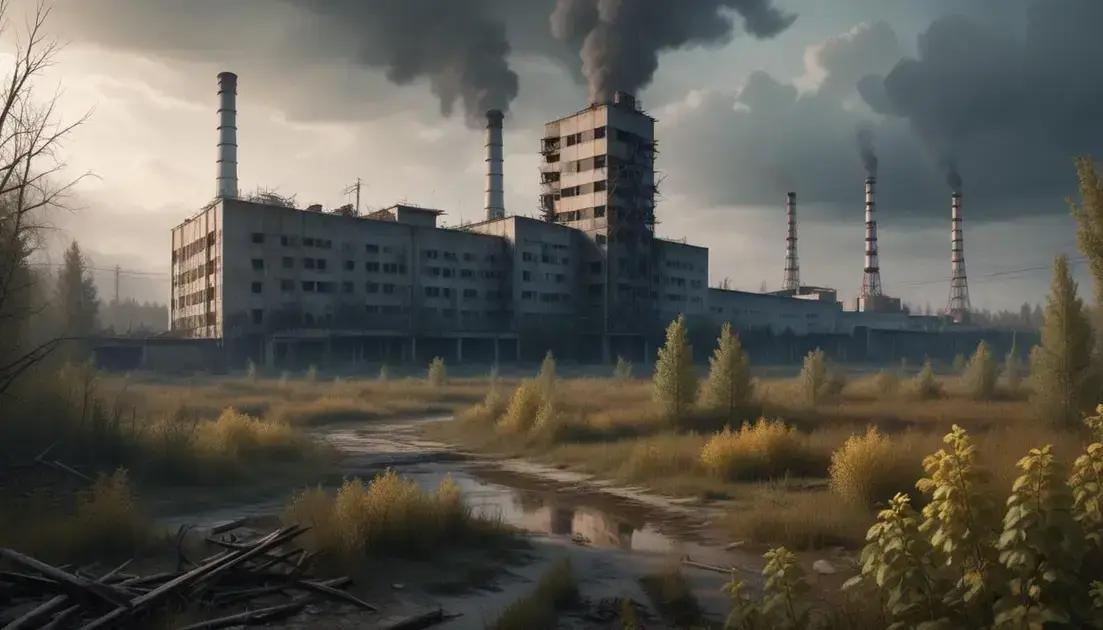
The Nuclear Fear and the Psychological Trauma of the Cold War
The Cold War left lasting impacts on modern society, teaching us important lessons about communication, cooperation, and understanding diverse perspectives. These lessons remind us of the risks of escalation and the need to adapt to change. By reflecting on the Cold War’s effects, we can foster better relationships between nations and strive for a more peaceful future.
The Cold War shaped our world in numerous ways, but its deepest impacts lie within the psyche of generations. Have you ever wondered how these years of tension have transformed society?
Understanding Nuclear Fear during the Cold War
During the Cold War, nuclear fear was a major part of daily life. People worried about the possibility of a nuclear war and its impact on their lives. This fear was not just in the minds of leaders; it spread to families and children. Many lived in constant anxiety about what might happen next.
What Caused This Fear?
The threat of nuclear weapons was real. The arms race between the United States and the Soviet Union made things worse. Media coverage fueled fears too. People often heard about missile tests and military drills. These events made the world feel less safe.
How Did People Cope?
Many sought comfort in community. They joined groups that discussed peace and safety. Others turned to education, wanting to know more about nuclear power. Schools even held drills to prepare students for potential attacks. These drills, though scary, aimed to give people a sense of control.
The Role of Media
Films and TV shows during this time often reflected the fear of nuclear war. Movies like “Dr. Strangelove” used humor to show how absurd the situation was. These portrayals helped people talk about their fears in a more open way. They allowed for discussion in a world filled with uncertainty.
The Long-lasting Impact
This nuclear fear didn’t just fade away after the Cold War. It shaped how generations view safety and security. Even today, the memories of those fears influence discussions about nuclear weapons.
Understanding the roots of this fear can help us learn how to deal with anxiety about the future. It shows the need for dialogue and peace in our world, making sure history doesn’t repeat itself.
Exploring Psychological Trauma of War
War can leave deep scars on those who experience it. The psychological trauma of war affects soldiers and civilians alike. It’s not just about physical wounds. Many people suffer silently, facing mental battles long after the fighting stops.
What is Psychological Trauma?
Psychological trauma happens when someone experiences or witnesses a shocking event. In war, this could be explosions, violence, or loss of loved ones. These experiences can lead to conditions like PTSD, which stands for Post-Traumatic Stress Disorder.
Signs of Trauma
People with trauma may have trouble sleeping or experience nightmares. They might feel anxious or tense, even in safe places. Flashbacks can make them feel like the event is happening again. All of this makes daily life difficult.
How War Changes Lives
Not everyone responds to trauma in the same way. Some people may find it hard to integrate back into everyday life. Relationships can suffer, and people may isolate themselves. Understanding this impact is key to supporting those affected.
Seeking Help
Getting help is crucial for healing. Counseling can provide a safe space to talk about feelings. Support groups also let people share experiences with others who understand. Talking and connecting with others can help lessen the burden.
The Importance of Awareness
Recognizing the symptoms of psychological trauma is vital. By understanding the effects of war on mental health, we can create a supportive environment. Awareness can lead to better resources and help for those in need.
Coping Mechanisms for a Fractured Society
In times of turmoil, like during the Cold War, people needed ways to cope. Society can feel fractured and uncertain. Finding healthy coping mechanisms is essential for everyone.
Understanding Coping Mechanisms
Coping mechanisms are strategies we use to deal with stress. They can be healthy or unhealthy. Healthy ways help us manage emotions and improve well-being, while unhealthy ones can cause more problems.
Healthy Ways to Cope
Talking to friends or family can be a great way to share feelings. Many find comfort in expressing their thoughts and fears. Joining community groups or clubs can also build support networks. Doing things together helps reduce feelings of isolation.
Physical Activity
Exercise is a fantastic outlet for stress. It releases endorphins, which boost mood. Whether it’s a walk in the park or a workout, finding ways to stay active can make a big difference.
Mindfulness and Relaxation
Practicing mindfulness or relaxation techniques can help calm the mind. Simple activities like meditation or deep breathing can reduce anxiety. Taking time for yourself to relax and recharge is crucial.
Seeking Professional Help
Sometimes talking to a professional is necessary. Therapists can provide support and tools to cope with stress. They offer strategies tailored to your needs, allowing for personal growth and healing.
By finding effective coping mechanisms, individuals can navigate challenges. Strong support systems and healthy activities help rebuild a fractured society, promoting unity and resilience in tough times.
Lasting Effects on Modern Generations
The lasting effects of the Cold War continue to shape modern generations in many ways. People today feel echoes of past tensions and fears. These experiences influence how we perceive safety and security in the world.
Cultural Impact
Media and art from the Cold War era still resonate. Movies, books, and music reflect the anxieties of that time. They keep reminding us of the threats people faced. This cultural legacy helps younger generations understand history.
Political Views
Modern politics often feels the impact of Cold War attitudes. Many still see the world in terms of “us versus them.” These perspectives can influence decisions about national security and foreign policy.
Social Behavior
Fear of nuclear conflict has led to a culture of caution. People might be more risk-averse and value peace. This mindset can affect how we interact with others and build relationships.
Mental Health Considerations
The anxiety from the Cold War years can linger. Many individuals feel stress about global events. Understanding this connection is vital for addressing mental health in today’s society.
Lessons Learned
Modern generations can learn from the past. By studying the Cold War, we can better understand how to work towards peace. This awareness encourages dialogue and cooperation among nations.
Lessons Learned from the Cold War
Many lessons learned from the Cold War remain relevant today. Understanding these lessons can guide us as we face new challenges. The Cold War taught us about the importance of diplomacy and communication.
The Importance of Communication
Clear communication can help prevent misunderstandings. During the Cold War, lack of communication led to fear and tension. So, keeping lines open can diffuse potential conflicts.
Value of Cooperation
Working together is crucial. Countries realized that collaboration could lead to peace. Agreements, like arms control treaties, showed the value of teamwork in global affairs.
Understanding Different Perspectives
It’s vital to recognize how others see the world. Different viewpoints can change how we interact. Learning about others’ histories and beliefs can build bridges.
The Risk of Escalation
The Cold War showed us how quickly things can escalate. Small conflicts can turn into larger wars. That’s why monitoring tensions and avoiding rash actions is essential.
Adapting to Change
Change is constant in international relations. The end of the Cold War brought new challenges. Being flexible and open to new strategies is vital for addressing today’s issues.
Conclusion
In conclusion, the lessons learned from the Cold War are crucial for our times. They remind us of the power of communication and cooperation in preventing conflicts. Understanding different perspectives helps to foster better relationships. The risks of escalation teach us to approach tensions with care.
Adapting to change is also important in today’s world. As we face new challenges, keeping these lessons in mind will guide us towards peace and mutual understanding. By learning from the past, we can work together to create a safer future for all.


